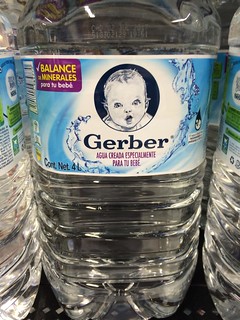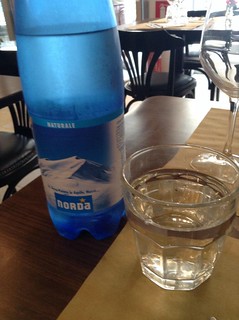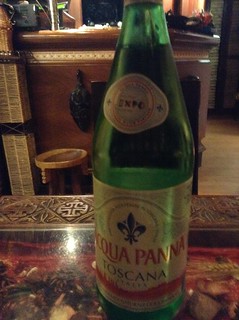 While I was trying to desperately finish two book chapters and two articles, I saw heated discussions around Nestlé fly by. Nestlé is the global, multinational company whose claim to fame goes well beyond producing baby food, and is one of the top bottled water producers. Some say that Nestlé controls 70% of the global bottled water market. Many of the protests that Nestlé faced occurred in two currently drought-stricken areas: California, in the United States of America, and British Columbia, in Canada (actually pretty close to my hometown of Vancouver). Even more so, alarming figures around how much water Nestlé was extracting practically for free in both regions circulated on social media, news sites, and newspapers, giving rise to a series of online mobilizations to rally against the multinational.
While I was trying to desperately finish two book chapters and two articles, I saw heated discussions around Nestlé fly by. Nestlé is the global, multinational company whose claim to fame goes well beyond producing baby food, and is one of the top bottled water producers. Some say that Nestlé controls 70% of the global bottled water market. Many of the protests that Nestlé faced occurred in two currently drought-stricken areas: California, in the United States of America, and British Columbia, in Canada (actually pretty close to my hometown of Vancouver). Even more so, alarming figures around how much water Nestlé was extracting practically for free in both regions circulated on social media, news sites, and newspapers, giving rise to a series of online mobilizations to rally against the multinational.
Given that all these discussions occurred when I was trying to get some of my research work published, I couldn’t comment nor provide meaningful analysis and discussions around whether Nestlé is actually the devil incarnate or not. What I can say, however, is what I have said before (which is based on my research): every time you purchase a bottle of water, you are contributing to the commodification of a natural resource, which has now been approved as a human right.
Every time you purchase a bottle of water, you are effectively contributing to its commodification. Think about it. pic.twitter.com/hvxupIzTvS
— Dr Raul Pacheco-Vega (@raulpacheco) July 29, 2015
Some practitioners and industry folks who don’t seem to agree with my view (the one I posited on the tweet above) argue that in reality, bottled water is not all that water consuming, and that “there are other industries that consume even more water and why is nobody complaining about those?” Well, for starters, one would need to have accurate data on water withdrawals from aquifers, recharge rates, and a number of other figures that are not so readily available and often are not all that trustworthy. These data would be necessary at least to comparatively discuss the negative impact that the bottled water industry has on aquifers. We don’t actually have those data. All those numbers you see reported? Most of them are SELF-reported. And as any good geohydrologist will tell you, knowing how much water is available in an aquifer is not as easy as one would make it seem. Data on groundwater availability are sparse and not all that accurate.
 Moreover, one of my biggest beefs with discussions on the actual global bottled water market is that, unless you pay a pretty hefty price, you won’t get accurate data. At least, data that you can potentially analyze and use. If I wanted to purchase a copy of the 2015 Market Research Report on Global Bottled Water Industry, I’d need to pay $2,800 dollars. Very few granting agencies would be happy for me to spend that much money just to know how much bottled water is being marketed, sold and distributed. Obviously, Nestlé will tell you that it is a very small bottled water user. But interestingly enough, it is one of the top three market share holders (reportedly at 7.3%). Danone was ranked second with a market share of 10.1 percent, and the global market was estimated at 200.3 billion U.S. dollars.
Moreover, one of my biggest beefs with discussions on the actual global bottled water market is that, unless you pay a pretty hefty price, you won’t get accurate data. At least, data that you can potentially analyze and use. If I wanted to purchase a copy of the 2015 Market Research Report on Global Bottled Water Industry, I’d need to pay $2,800 dollars. Very few granting agencies would be happy for me to spend that much money just to know how much bottled water is being marketed, sold and distributed. Obviously, Nestlé will tell you that it is a very small bottled water user. But interestingly enough, it is one of the top three market share holders (reportedly at 7.3%). Danone was ranked second with a market share of 10.1 percent, and the global market was estimated at 200.3 billion U.S. dollars.
Just think about that for a second.
200 billion US dollars.
Supposedly this water will make you smart… #right2water #watercommodification @DrKarenBakker @leilaharris @H2OEthics pic.twitter.com/OckwUVdvCF
— Dr Raul Pacheco-Vega (@raulpacheco) November 7, 2014
Moreover, the campaigns to promote bottled water now reach stupidity proportions that are bewildering. I have seen “Smart Water” marketed (see tweet above), I’ve also seen “Light Water” (Bonafont, a Mexican subsidiary of Danone), artisanal water (Fiji and San Pellegrino). Ironically, when I visited Milan for the International Conference on Public Policy 2015 (ICPP 2015), every single restaurant where I ate offered me bottled water FOR SALE. Italians seemed quite proud of selling their own water, and of consuming (and paying for) bottled water, even though I saw plenty of public water fountains across Milan.
 In my own research, I have been studying not only the global political dynamics of bottled water consumption, but also the factors that drive increased consumption, given that Mexico has been touted as one of (if not THE) top consumers (measured in consumption per capita) of bottled water worldwide. I have also been analyzing the relative successes that tap water promotion campaigns have been having on US and Canadian campuses. My recent fieldwork has enabled me to inquire from people what makes them drink bottled water, and the driving factors aren’t always the ones I expect. For example, I always believed that ease of access drove much of the local bottled water consumption. Not surprising, but public health concerns seem to be the major driving factor so far (I am conducting a large scale survey and also preparing a couple of field experiments on this topic).
In my own research, I have been studying not only the global political dynamics of bottled water consumption, but also the factors that drive increased consumption, given that Mexico has been touted as one of (if not THE) top consumers (measured in consumption per capita) of bottled water worldwide. I have also been analyzing the relative successes that tap water promotion campaigns have been having on US and Canadian campuses. My recent fieldwork has enabled me to inquire from people what makes them drink bottled water, and the driving factors aren’t always the ones I expect. For example, I always believed that ease of access drove much of the local bottled water consumption. Not surprising, but public health concerns seem to be the major driving factor so far (I am conducting a large scale survey and also preparing a couple of field experiments on this topic).
What I have found so far is that most people don’t seem to be aware of just how little water is available for human consumption. In my interviews I have also found that many bottled water consumers are unaware that water has been named as a human right (and that there is actual legislation in Mexico on the human right to water, Article 4 of the Mexican Constitution was amended to include a provision to this effect, in April of 2012).
In sum, while industry folks may think I am against bottled water just out of ideology, I am deeply concerned about the commodification and marketization of a resource as valuable and important as water is. Because as I have argued elsewhere, water becomes not only a natural resource but a political (and politicized) one. And THAT, precisely, is what makes the politics of bottled water so interesting to me. But moreover, I am concerned about increased bottled water consumption because it poses an intrinsic threat to the full implementation of a human right to water.
Properly implementing the human right to water would mean the end of bottled water, increased pressure on infrastructure, end of sodas.
— Dr Raul Pacheco-Vega (@raulpacheco) May 12, 2014
And that’s something I am not about to keep silent about.

Thanks for your great piece, Raul. I have a few reactions, but in order to keep this short let me just make a point about the relationship between the human right to water and the commodification of water. I would like to push you a little to further specify the implications of bottled water as commodification. I completely agree with you about how bottled water consumption implies the commodification of water. However, by making that statement in an isolated way you are opening yourself to the criticism that buying bottled water does not majorly impact the consumption of tap water from public delivery services. Except in extreme cases, people do not use bottled water to cook, bathe, or for other domestic necessities, and therefore the purchase of bottled water for personal consumption does not necessarily imply a major change in the source of most of the water people use. This is not to say that the consumption of bottled water is not problematic, particularly when you consider the wider environmental implications. Yet you are making the point that the commodification involved in the increased use of bottled water is dangerous because of what it means for the human right to water. Even if large amounts of water in some areas devoted to bottled water, how does this lead to the commodification of people’s access to water if most of the water they consume comes from the tap? I believe that, beyond the data that we need on water withdrawals destined to the water bottle industry, which might be significant in some areas, the point you make also requires knowing the proportion of people’s water consumption that comes from bottled water. Another way of tackling the question is to go beyond quantities and make the case for why consuming bottled water, even if it represents a small percentage of the total amount of water a household uses, can trigger other processes that will be detrimental for people’s access to water. Is it an issue of ownership of the bulk resource, which will make it harder to have enough water at a cheap price for the general population? Is it about starting a trend towards the corporate use of water that can reinforce the privatization of municipal water provision? Or is this a more cultural problem, since when people get used to paying large amounts of money for some water we are likely to change the way we understand access to water more generally, with unknown but predictable problems for the access to water of vulnerable groups? I hope I am being clear in what I mean here: I agree with you that bottled water implies its commodification, but I think that we need to go beyond just saying that lots of water resources are devoted to the bottled water market and specify the ways in which this will have an impact on people. I also believe that this would force us to clarify what we really mean by commodification and its implications, since this is a term that we use generally all the time but is seldom treated analytically.